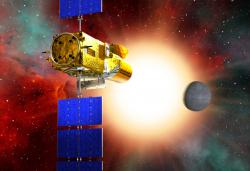The telescope will try to locate planets in other solar systems by observing and analyzing the light pattern of the main stars in the systems
 Hubble, Chandra and Spitzer are now joined by a new family member - a telescope of the European Space Agency called COROT which should be launched today, December 27, 2006.
Hubble, Chandra and Spitzer are now joined by a new family member - a telescope of the European Space Agency called COROT which should be launched today, December 27, 2006.
The telescope that will be used to hunt for planets is called COROT (acronym for the phrase "Convection Rotation and planetary Transits"). The first part of the name - convection rotation means that COROT will be able to dig inside the layers of the stars, and measure the acoustic waves that vibrate on their surface.
Astronomers call this technique asteroseismology. The second part of the name, planetary transit, refers to the telescope systems ability to measure the dimming of starlight when a planet crosses in front of it. This ability, of hunting planets is the most interesting of the two missions of the satellite. COROT will monitor hundreds of thousands of stars simultaneously, trying to see which ones exhibit periodic dimming and brightening.
Most of the planets that COROT is expected to discover will almost certainly be hot Jupiters, large planets in close orbit around their parent star. However, the instruments may be sensitive enough to detect rocky planets whose orbit around the star is up to 50 days. This may provide science with a new type of planets that could not be discovered until now.
It is to be hoped that a malfunction will not occur in the launch or in the telescope's instruments after its activation and that we will be able to receive the extraordinary scientific output without waiting too long for it.
According to the announcement of the European Space Agency on the Universe Today website
